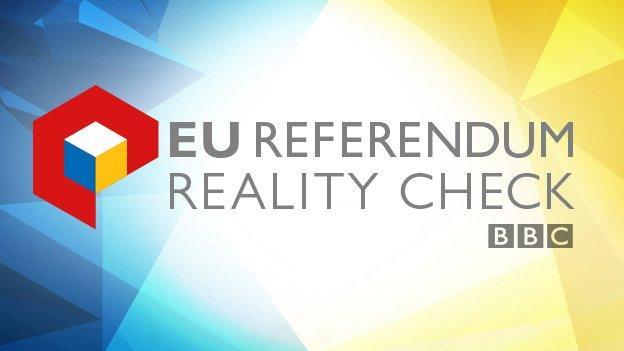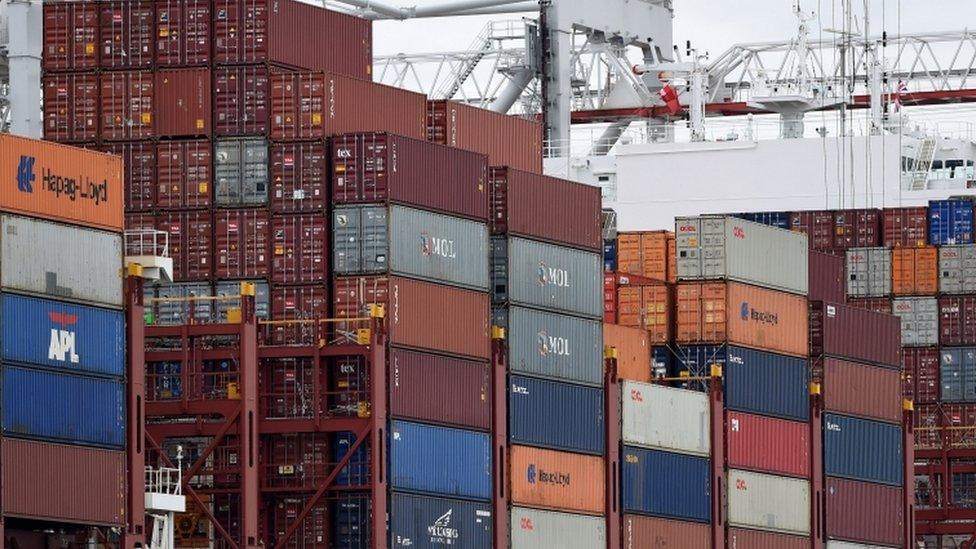Reality Check: Would Brexit cost every household £850?
- Published

The UK leaving the European Union would knock £850 off the average UK household's income, according to a report from the Centre for Economic Performance (CEP) at the London School of Economics.
And that's its conclusion taking an "optimistic" view. The pessimistic conclusion from the report, external is £1,700 per household.
Where has that come from? The CEP is predicting 1.3% to 2.6% fall in GDP, which is the value of everything produced in the economy, currently about £1.8tn a year. Take 1.3% of that and divide by the 27 million households in the UK and you have your answer.
That's not the same as saying it would cost every household £850. A drop in GDP equivalent to £850 per household would be expected to cut household incomes, but probably not by that much. (Average household income after tax is about £44,000, so £850 is almost 2%.)
So beyond that, is it true? No, almost certainly not - it's a result of economic modelling.
The problem is that any such predictions involve making big assumptions about what would happen in the event of the UK leaving the EU.
The conclusions are extremely sensitive to such assumptions. For example, the losses double if you move from the "optimistic" to "pessimistic" conclusions about what sort of trade deal a post-Brexit UK would reach with the EU.
The losses would be tripled if you moved the trade model from static to dynamic (dynamic models include changes that happen over time such as trade increasing competition or efficiency). In the long run, the report says the losses could get up to between £4,200 and £6,400 per household per year.
Optimistic view?
The optimistic scenario assumes that the UK reaches a Norway-style deal, which retains full access to the single market, but only predicts a 17% fall in the UK's contribution to the EU Budget (in line with Norway). But nonetheless, trade falls as a result of non-tariff barriers to trade, which are things like rules and quotas that are designed to stop competition from another country's products.
Is that an optimistic view? If you were being really optimistic you could predict that the UK manages to negotiate a fabulous deal that allows full access to the single market without any contributions to the EU Budget. You could also optimistically predict that leaving the EU ushers in a golden age of entrepreneurship and productivity growth, making trade go through the roof.
Similarly, the CEP's pessimistic view is that the UK ends up as just another member of the World Trade Organization, but you could have a really pessimistic view in which the rest of Europe is so cross about the UK leaving that it refuses all deals, deliberately blocks UK products and trade goes through the floor.
So when you look at any economic modelling it's important to look at who is doing it. The CEP is made up of many top-notch, hugely-respected economists from an institution with an excellent reputation. I would have no hesitation in quoting them in a BBC article.
'Ridiculous claims'
But Vote Leave has pointed out this morning that the CEP is part-funded by the European Commission and in 2000 published a paper by Willem Buiter, external, who had just left the Bank of England's interest rate-setting Monetary Policy Committee, calling for the UK to adopt the euro.
"These ridiculous claims lack credibility as they come from the same economic sages who said we would better off scrapping the pound," said Matthew Elliott, chief executive of Vote Leave.
Nobody knows what would happen if the UK were to leave the EU, so well-qualified people are trying to guess. There is little reason to believe they are guessing correctly. Predicting things is a thankless task - remember those opinion polls at last year's general election?
Incidentally, this isn't just a point about this particular report. I would say much the same thing about the Civitas study, external that concluded there was a cost of between £15bn and £40bn to staying in the EU, or the Open Europe, external model that estimated a cost of Brexit of somewhere between a 2.2% fall in GDP and a 1.6% rise.
If economic modelling should not be guiding your thinking, then why are we covering it?
Because you can bet your last pound or euro that next week somebody supporting staying in the EU will say in a speech that leaving the EU will cost between £850 and £1,700 per household.
And I don't want you to be left wondering where the figure came from.


READ MORE: The facts behind claims in the EU debate

- Published22 February 2016

- Published17 March 2016

- Published10 March 2016

- Published1 March 2016
